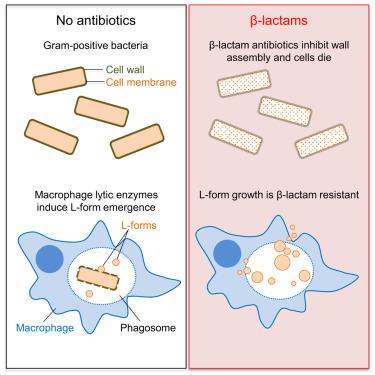Our official English website, www.x-mol.net, welcomes your feedback! (Note: you will need to create a separate account there.)
Lysozyme Counteracts β-Lactam Antibiotics by Promoting the Emergence of L-Form Bacteria.
Cell ( IF 64.5 ) Pub Date : 2018-Feb-22 , DOI: 10.1016/j.cell.2018.01.021 Yoshikazu Kawai 1 , Katarzyna Mickiewicz 1 , Jeff Errington 1
Cell ( IF 64.5 ) Pub Date : 2018-Feb-22 , DOI: 10.1016/j.cell.2018.01.021 Yoshikazu Kawai 1 , Katarzyna Mickiewicz 1 , Jeff Errington 1
Affiliation

|
β-lactam antibiotics inhibit bacterial cell wall assembly and, under classical microbiological culture conditions that are generally hypotonic, induce explosive cell death. Here, we show that under more physiological, osmoprotective conditions, for various Gram-positive bacteria, lysis is delayed or abolished, apparently because inhibition of class A penicillin-binding protein leads to a block in autolytic activity. Although these cells still then die by other mechanisms, exogenous lytic enzymes, such as lysozyme, can rescue viability by enabling the escape of cell wall-deficient "L-form" bacteria. This protective L-form conversion was also observed in macrophages and in an animal model, presumably due to the production of host lytic activities, including lysozyme. Our results demonstrate the potential for L-form switching in the host environment and highlight the unexpected effects of innate immune effectors, such as lysozyme, on antibiotic activity. Unlike previously described dormant persisters, L-forms can continue to proliferate in the presence of antibiotic.
中文翻译:

溶菌酶通过促进L型细菌的出现来抵消β-内酰胺抗生素。
β-内酰胺类抗生素可抑制细菌细胞壁的组装,在通常为低渗的经典微生物培养条件下,可引起爆炸性细胞死亡。在这里,我们表明,在更生理的,渗透保护的条件下,对于各种革兰氏阳性细菌,裂解被延迟或取消,这显然是因为对A类青霉素结合蛋白的抑制导致自溶活性的阻滞。尽管这些细胞仍会通过其他机制死亡,但是外源性裂解酶(如溶菌酶)可以通过逃逸细胞壁缺陷的“ L型”细菌来拯救生存力。在巨噬细胞和动物模型中也观察到这种保护性L型转化,可能是由于产生了包括溶菌酶在内的宿主裂解活性。我们的结果证明了在宿主环境中进行L型转换的潜力,并突出了先天性免疫效应物(如溶菌酶)对抗生素活性的出乎意料的影响。与先前描述的休眠持久性不同,L型可以在存在抗生素的情况下继续增殖。
更新日期:2018-02-15
中文翻译:

溶菌酶通过促进L型细菌的出现来抵消β-内酰胺抗生素。
β-内酰胺类抗生素可抑制细菌细胞壁的组装,在通常为低渗的经典微生物培养条件下,可引起爆炸性细胞死亡。在这里,我们表明,在更生理的,渗透保护的条件下,对于各种革兰氏阳性细菌,裂解被延迟或取消,这显然是因为对A类青霉素结合蛋白的抑制导致自溶活性的阻滞。尽管这些细胞仍会通过其他机制死亡,但是外源性裂解酶(如溶菌酶)可以通过逃逸细胞壁缺陷的“ L型”细菌来拯救生存力。在巨噬细胞和动物模型中也观察到这种保护性L型转化,可能是由于产生了包括溶菌酶在内的宿主裂解活性。我们的结果证明了在宿主环境中进行L型转换的潜力,并突出了先天性免疫效应物(如溶菌酶)对抗生素活性的出乎意料的影响。与先前描述的休眠持久性不同,L型可以在存在抗生素的情况下继续增殖。



























 京公网安备 11010802027423号
京公网安备 11010802027423号